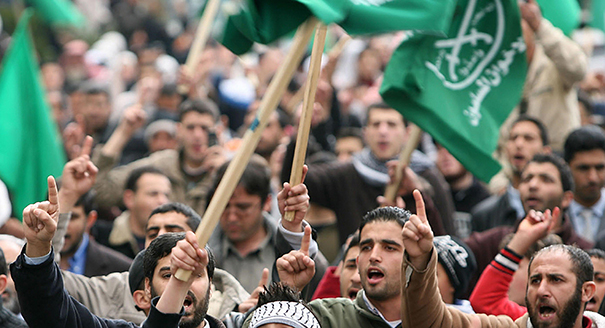Shadi Hamid | Senior fellow at the Brookings Institution and coeditor of Rethinking Political Islam (Oxford University Press, 2017)
Designating the Muslim Brotherhood as a terrorist organization would be new and unprecedented. In effect, it would be the first time that a U.S. administration declared that millions of Muslims are terrorists. Terrorist designations usually only target organizations—such as Al-Qa‘eda or the Islamic State—that however well-known or influential can only claim a relatively small number of members or active supporters. The Brotherhood, in contrast, is a mass movement.
Because Muslim Brotherhood or Brotherhood-linked groups are often the largest groups that oppose authoritarian regimes and call for democratic elections (even if observers might disagree over the sincerity of such commitments), designation would remove any pretense that the United States has even a passing interest in supporting Arab democracy. For the Trump administration, however, this is likely a feature rather than a bug, since its Middle East strategy is explicitly oriented toward shoring up and empowering authoritarian regimes. Designation would mean that the United States, the ostensible leader of the free world, wouldn’t just be turning a blind eye to repression—which is nothing new—but giving it official sanction. It would be U.S. policy, at least until a future president, most likely a Democrat, might decide to undo it.
Nervana Mahmoud | Egyptian doctor, blogger, and commentator on Middle Eastern issues
The Muslim Brotherhood is not a conservative Muslim party, but a cult that abuses Islam. By designating the group as a terrorist organization, the United States would send a clear message that it is firmly against the toxic ideology of Islamism, not the faith of Islam. Curtailing the group’s cancerous expansion among the American Muslim community would help counter Islamophobia by making it clear to the American public that Islam is not the enemy.
It would also send a message to regional players in the Middle East that the U.S. will not tolerate tactical deceptions by allies or excuses by others. Those, such as Turkey, who label the Kurdistan Workers Party and the Gülen movement as terror groups while continuing to support Hamas and the Muslim Brotherhood will understand that the U.S. rejects such dualism. Arab regimes that resist democratic reforms under the premise of fighting terrorism would run out of excuses. And the cult would finally understand that its talent for deceptive violence has consequences. Muslim Brotherhood sympathizers inside and outside the U.S. may not like the decision, but their noise is irrelevant. The U.S. has an opportunity to kickstart a new post-Islamist world order with clear values and policies that are needed now more than ever.
Alison Pargeter | Senior visiting fellow in the Institute of Middle Eastern Studies at King’s College in London, author of The Muslim Brotherhood: The Burden of Tradition (Saqi Books, 2010)
Designating the Muslim Brotherhood a terrorist organization would open the door to further tyranny in a region already replete with repression. Authoritarian regimes have long used the threat of Islamism to justify suppressing political opponents. Yet for all its illiberal tendencies, the Brotherhood has desisted from embracing violence, despite the many challenges it faces today. By buying into a narrative that the Brotherhood is a terrorist group, the United States would provide further justification for many regimes to silence whoever dares oppose them. It would also help cement the rule of anachronistic and authoritarian forces, depriving the region of any genuine opposition and undermining any prospect for real change.
A designation would also embroil Washington further in the regional conflict between Qatar and Turkey on the one side and Egypt, Saudi Arabia, and the United Arab Emirates on the other. The Muslim Brotherhood has become a pawn in this power struggle between undemocratic forces that is wreaking havoc in the region. One needs to look no further than the catastrophic situation in Libya to understand the damage that it has done. For the U.S. to throw its weight even more strongly behind one side in this fight will escalate tensions and bring more misery to a region crying out for change.
Marc Lynch | Nonresident senior fellow in the Carnegie Middle East Program
The Trump administration’s renewed move to designate the Muslim Brotherhood as a terrorist organization would fit its pattern of repeatedly reviving discredited, politically convenient ideas without regard for their likely consequences.
The degree of consensus among experts that the Brotherhood is not a terrorist organization is striking, especially given the intense disagreements among those experts about every other aspect of the organization’s ideology, behavior, and politics. Muslim Brotherhood factions have evolved in many different directions since 2011. They have been shattered by the military coup in Egypt, run the government in Morocco, shared power in Tunisia, and taken a leading role in the Syrian opposition. Therefore, a designation would have little to do with reality. It would serve President Donald Trump’s domestic political interests, pandering to the anti-Islamic biases of the American right and pressuring Muslim civil society organizations.
In the Middle East, such a designation would be taken as a signal of support for autocratic allies such as the United Arab Emirates, Saudi Arabia, and Egypt, which long ago issued such a designation to justify the 2013 Egyptian military coup, pressure political opponents at home and across the region, and pursue a quixotic campaign against Qatar. For Trump, those benefits likely outweigh the potential costs, given that he views strengthening autocratic regimes and harming the prospects for democracy as something positive. For the region, however, the move would be one more destabilizing provocation, adding pressure on shaky regimes and exacerbating the lines of regional conflict.








